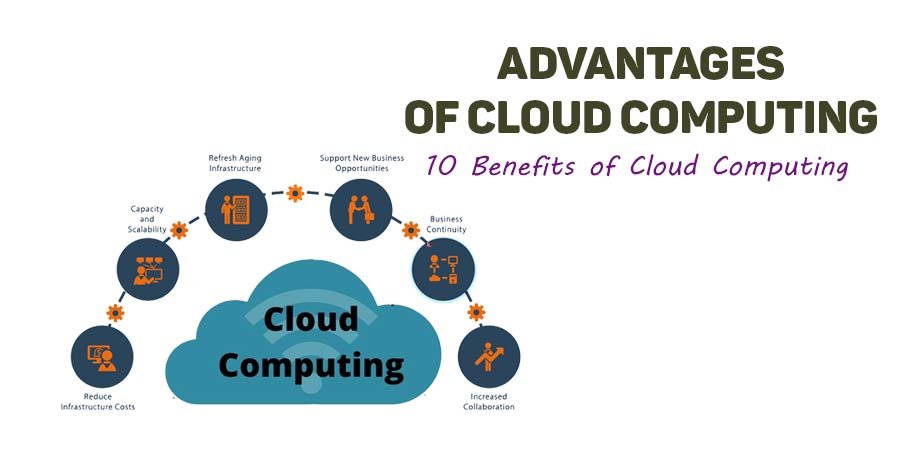What are the Advantages of Cloud Computing?
Updated: September 6, 2024
39
Cloud computing has dramatically transformed the landscape of technology and business operations. By leveraging the power of the internet, cloud services offer a range of benefits that enhance efficiency, reduce costs, and improve flexibility.
This modern approach to computing supports various deployment models, including public, private, and hybrid clouds, catering to diverse needs. In this comprehensive article, we’ll delve into the top ten advantages of cloud computing, covering cost savings, scalability, enhanced collaboration, and more.

What are the advantages of cloud computing?
1. Cost Efficiency
Cloud computing eliminates the need for significant upfront investment in hardware and software. Instead, businesses can take advantage of a pay-as-you-go model, paying only for the resources they actually use.
This model reduces capital expenditures and operational costs, making it easier for organizations to manage their finances. Additionally, cloud providers handle the maintenance and upgrades of hardware and software, further lowering total costs.
2. Scalability and Flexibility
Cloud computing offers unmatched scalability, allowing businesses to quickly adjust their resource usage based on demand. This elasticity is ideal for handling varying workloads, seasonal peaks, or unexpected spikes in traffic. Organizations can scale their resources up or down with minimal effort, ensuring they have the necessary capacity without over-provisioning.
3. Enhanced Collaboration
With cloud computing, teams can collaborate more effectively regardless of their physical locations. Cloud-based applications and services enable real-time sharing and editing of documents and data, facilitating seamless communication and project management. This capability is particularly beneficial for remote work scenarios, where team members need to work together from different geographical locations.
4. Improved Security
Cloud providers invest heavily in advanced security measures, often exceeding what individual businesses can afford. Features such as data encryption, multi-factor authentication, and regular security audits help protect sensitive information. Additionally, cloud providers typically have dedicated security teams to monitor and address potential threats, enhancing overall security.
5. Automatic Updates and Maintenance
Cloud computing services often include automatic updates and maintenance, reducing the burden on IT staff. Providers manage software updates, security patches, and system upgrades, ensuring that users always have access to the latest features and protections without manual intervention. This streamlines operations and enhances system performance.
6. Disaster Recovery and Backup
Cloud computing offers robust disaster recovery and backup solutions that are both cost-effective and efficient. Cloud providers typically have multiple, geographically dispersed data centers, which ensures data redundancy and quick recovery in case of a failure or disaster. This high level of reliability minimizes downtime and helps organizations recover swiftly from unexpected events.
7. Environmental Sustainability
Cloud computing contributes to environmental sustainability by optimizing resource use and reducing the carbon footprint. Many cloud providers operate energy-efficient data centers and use renewable energy sources to power their operations. By consolidating computing resources and employing energy-efficient technologies, cloud computing helps reduce overall energy consumption and environmental impact.
8. Increased Agility
The cloud allows businesses to deploy and scale applications quickly, supporting agile development practices. This agility enables faster time-to-market for new products and services, helping organizations respond swiftly to market changes and customer demands. The ability to experiment and innovate with minimal risk further accelerates business growth.
9. Global Reach
Cloud computing provides a global infrastructure that enables businesses to operate and expand internationally with ease. By leveraging cloud services, organizations can deploy applications and services in multiple regions, ensuring low latency and high performance for users around the world. This global reach supports business expansion and enhances user experiences.
10. Simplified IT Management
Cloud computing simplifies IT management by offloading the complexities of infrastructure management to the cloud provider. Businesses no longer need to worry about hardware procurement, software installation, or system maintenance. Instead, they can focus on their core activities while relying on the cloud provider to manage and optimize the underlying infrastructure.
Conclusion
Cloud computing offers a plethora of benefits that significantly enhance business operations and individual productivity. From cost efficiency and scalability to improved security and global reach, the advantages of cloud computing are clear and impactful.
As technology continues to evolve, the role of cloud computing in driving innovation and efficiency will only grow. Embracing cloud solutions allows organizations to stay competitive, agile, and prepared for future challenges, making it a valuable investment in the modern technology landscape.
Please Write Your Comments